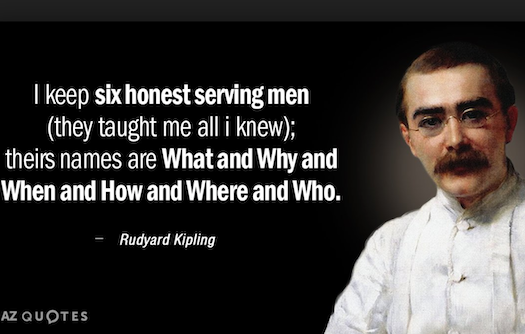Peady’s Selling Engagement
Regular readers will know I promote questioning skills as a vital component of any successful salesperson’s toolkit. If you conduct a sales conversation with a customer and don’t have pre-prepared, well researched and relevant questions to help drill down to uncover needs or opportunities you’re simply wasting your time (theirs too).
So, imagine my surprise when I discovered recently that one of the “questioning words” I regularly use and train others to use is big ‘no-no’!!
Welcome to this week’s post on sales and selling success.
In a customer meeting I rely on poet Rudyard Kipling who said:
“I keep six honest serving-men
They taught me all I knew;
Their names are What and Why and When
And How and Where and Who”
By asking questions using these words you can really learn a lot and drive the conversation in a focussed direction. But, one of those six words can slow you down and, in some cases, cause resistance. It’s “why”.
Why not, why?
According to a highly experienced, former FBI hostage negotiator anything starting with “why” makes people feel like they’re part of an interrogation. In other words, it raises their defences, which is unhelpful for gathering information.
Instead, he suggests asking ‘how’, ‘when’ or ‘what’ type questions which can help learn more about your potential customer’s business and challenges.
Source: “Never Split The Difference” by Chris Voss.
Makes sense to me. I’m all for removing any potential or real impediments to stopping or slowing down a business conversation.
How, When and What questions
Without “why” there are plenty of options to deliver strong questions within the business conversation framework.
Budget questions:
- How much would you say you spent on advertising in the last 12 months?
- Over the course of the next 12 months, do you envisage that figure changing?
Authority questions:
- Is this ultimately your decision? Who influences your decision?
- What is the purchasing process? When you go forward with a plan that makes sense for you, what steps do we have to take?
Needs questions:
- Do you track which is most effective in bringing in new enquiries (or leads)?
- What is your goal for new enquiries or leads in the next year?
Timeline or urgency questions:
- When do you want to do this?
- How quickly do you want to achieve that?
- When would you like to start?
To gain customer insights, you ask questions. And by carefully listening to what your prospects have to say – and offering comments when appropriate – you can learn more about your prospects and their business. You’ll also build rapport, increase trust and reduce resistance.
Until next week, good selling!
About the author
Stephen Pead is a media industry veteran of 30 years with significant experience in direct sales, sales management and general management. He is based in Sydney and specialises in helping SME’s market their businesses more effectively and providing training for salespeople and sales managers.
He can be contacted at [email protected]



